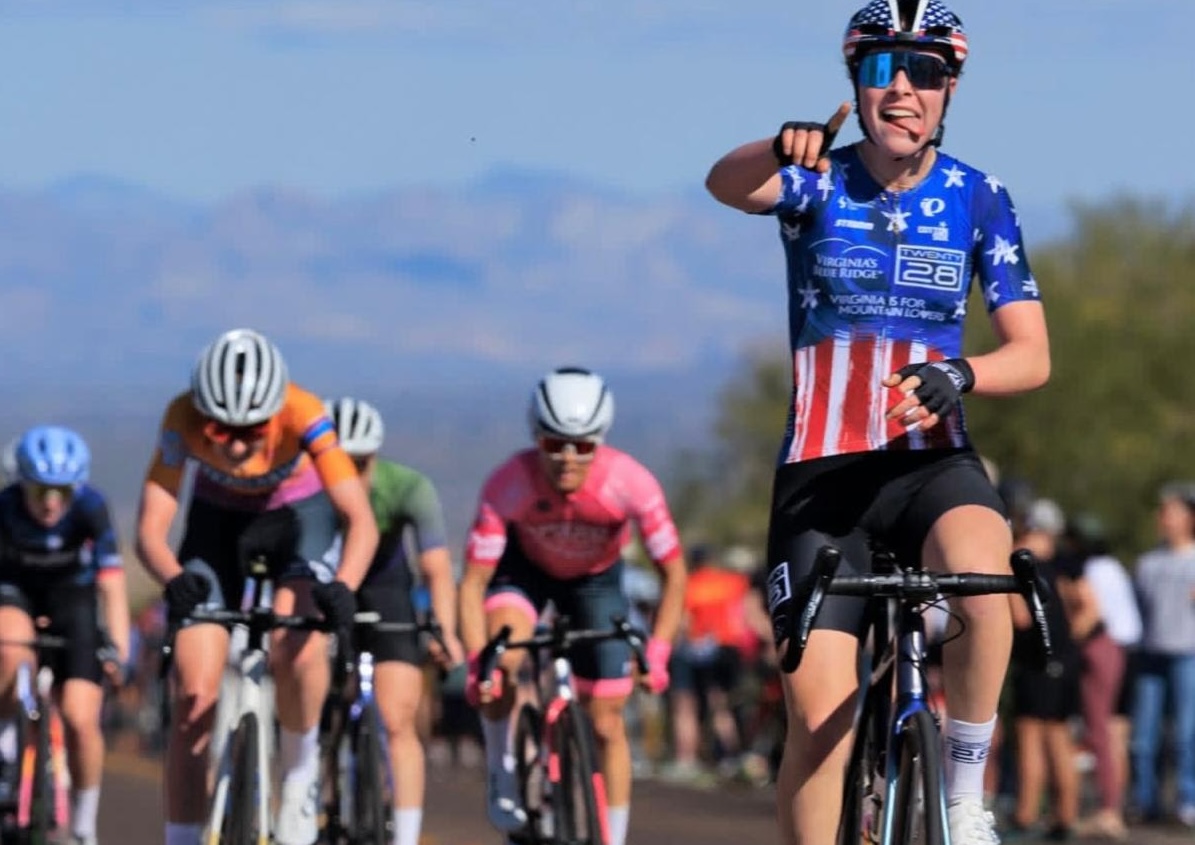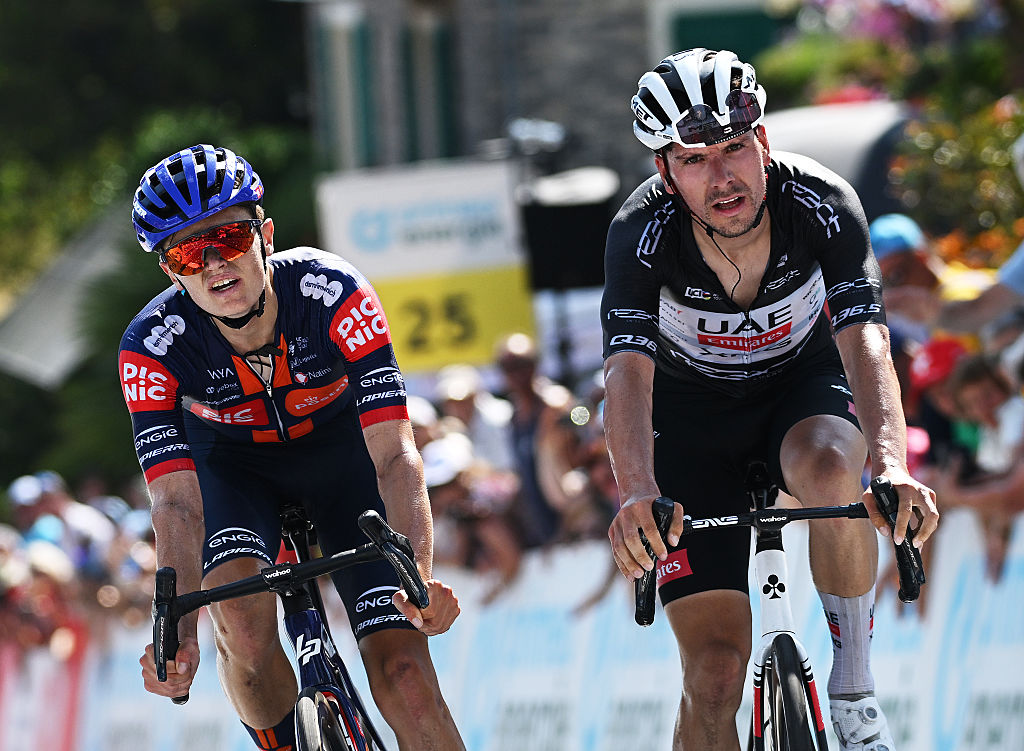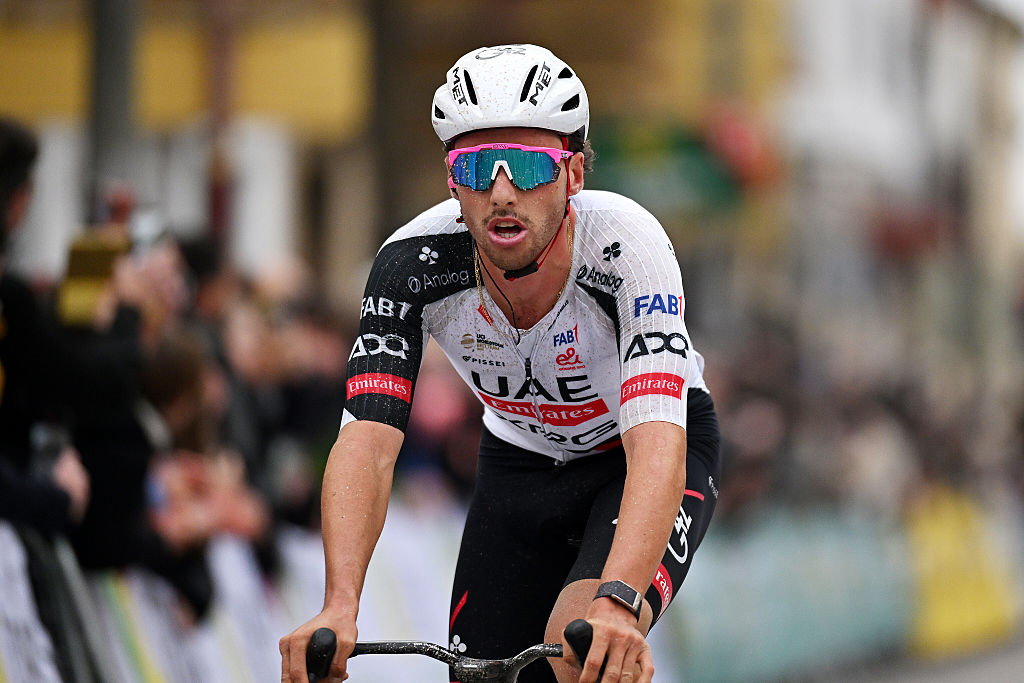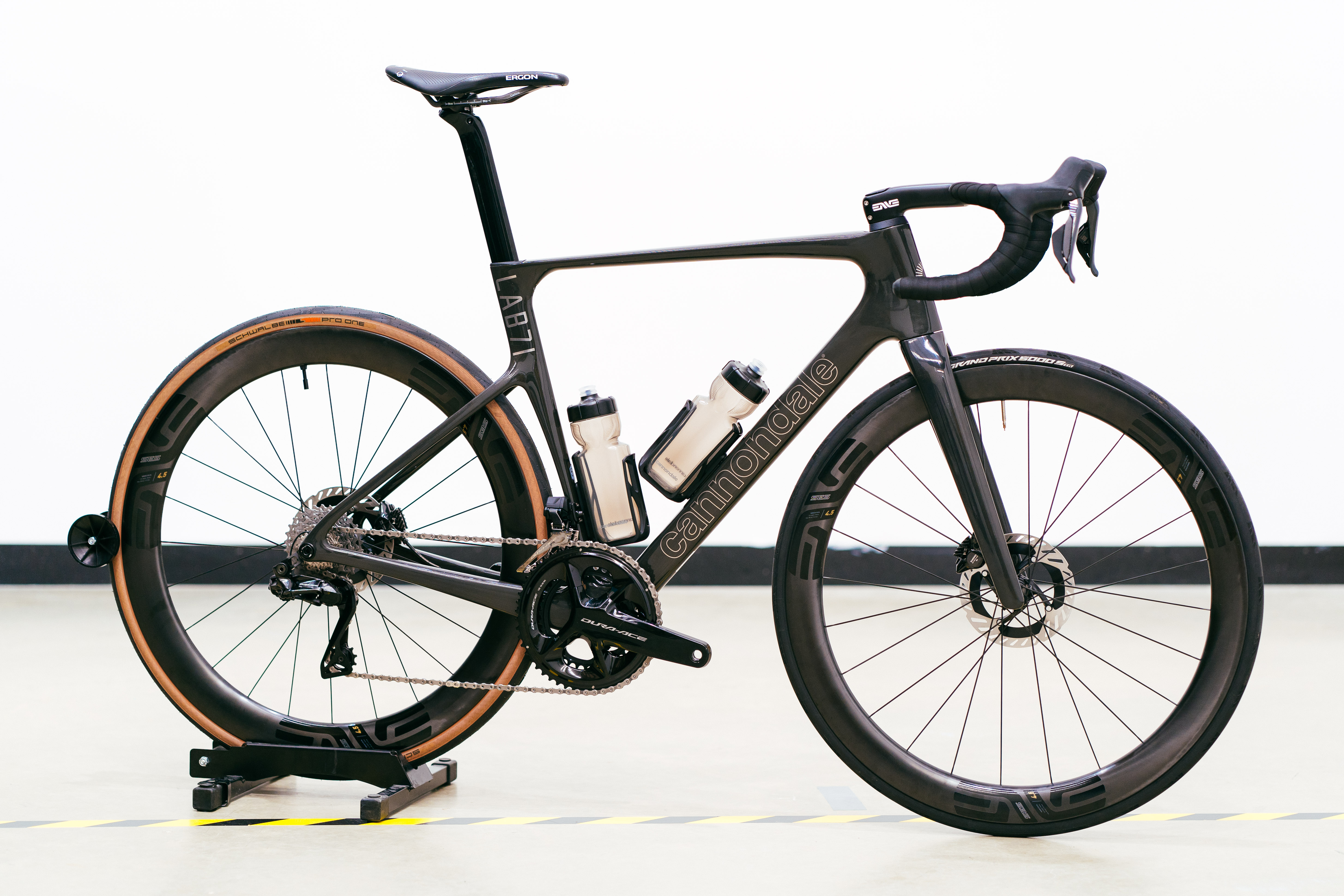Giro d'Italia's 'survival game' continues at Gran Sasso d'Italia – Preview
Evenepoel's injury and Soudal-QuickStep's strength face mountain test

The latest race content, interviews, features, reviews and expert buying guides, direct to your inbox!
You are now subscribed
Your newsletter sign-up was successful
At last year's Giro d'Italia, Enrico Gasparotto's tactical inventiveness helped lay the foundations for Jai Hindley's eventual overall victory, but the Bora-Hansgrohe directeur sportif knows that strategic thinking can only carry a man so far in a test of endurance like this one.
"It's a special Giro this year, and the weather has made it even harder," Gasparotto said on Naples' Piazza del Plebiscito on Thursday morning. "I think it's more a survival game than a tactical game."
Remco Evenepoel could doubtless appreciate the sentiment. After emerging bruised but unbroken from two separate crashes on the road to Salerno the previous afternoon, the world champion remains the favourite to claim the Trofeo Senza Fine, but his travails were a reminder that, at this early juncture, the Giro winner's name is written in water rather than set in stone.
With festivities for Napoli's recent Serie A title still ongoing, a football was inevitably produced when Evenepoel arrived to sign on, and his brief show of juggling suggested no lasting injury. He looked equally comfortable on the day's stage, which brought the gruppo through the hills ringing the base of Mount Vesuvius.
Evenepoel knows, however, that a far sterner examination comes on stage 7 when the Giro climbs above 2,000m for the first time with a summit finish at Gran Sasso d'Italia.
"The injuries will no longer affect me in the mountain stage tomorrow," he insisted after reaching the finish in Naples on Thursday. Perhaps, but the stage will also ask some exacting questions of his Soudal-QuickStep guard, who were found wanting in the finale at Lago Lageno on stage 4.
Certainly, after reckoning with Evenepoel's sobering show of force in the opening time trial in Ortona, Jack Haig (Bahrain Victorious) was among the riders drawing guarded encouragement from the Achilles heel that appeared to reveal itself during the Giro's first taste of the mountains.
The latest race content, interviews, features, reviews and expert buying guides, direct to your inbox!
"I think when it arrives to the proper mountain stages, and especially the final week, Remco might find himself quite isolated," said Haig.
The route
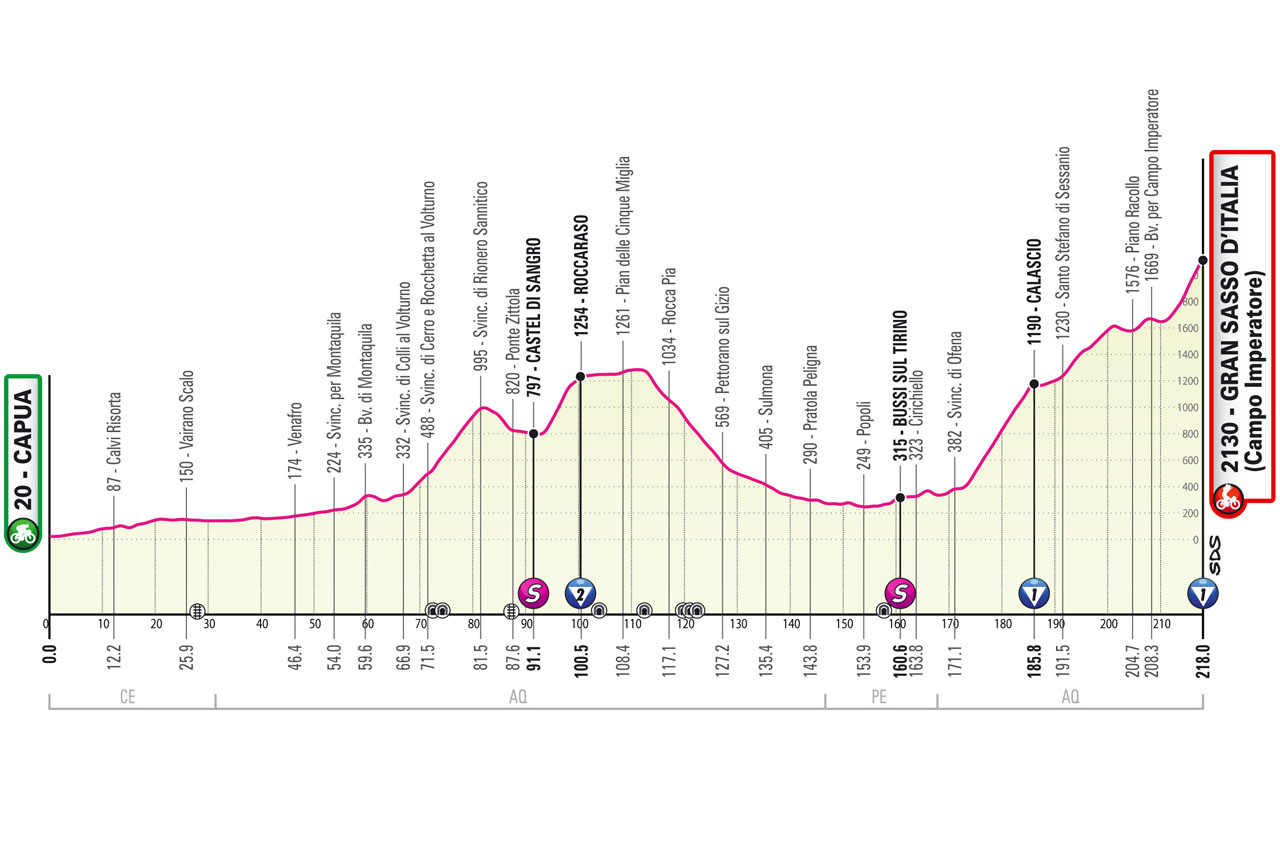
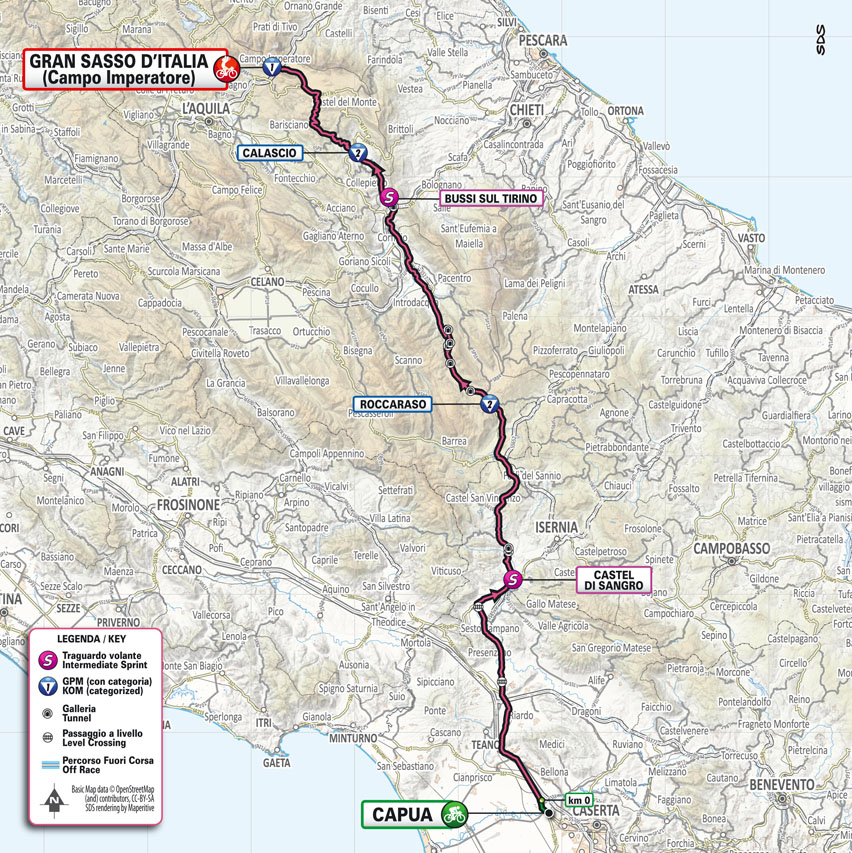
If Friday's long run back into the Apennines to Gran Sasso d'Italia isn't a proper mountain stage, then it will certainly do until the proper mountain stages get here. The race sets out from Capua, where Hannibal was vanquished by the Romans in 211 BC.
The defeat, Livy suggested, had come about because the Carthaginian troops had become too accustomed to luxury after spending the winter there, and Leo Tolstoy was later inspired to use the adjective 'Capuan' as a synonym for a life of ease in Anna Karenina.
There has, of course, been nothing Capuan about this Giro to date, and the hardship will continue on the 218km run from Campania into Abruzzo, with the road climbing steadily towards the Apennines from the outset. After an intermediate sprint in Castel di Sangro – captured so indelibly in the late Joe McGinniss' Miracle of Castel di Sangro – the peloton takes on the category 2 haul to the familiar waypoint of Roccaraso, the site of stage finishes in 2016 and 2020.
The day's main difficulty follows with the two-part climb up the Gran Sasso d'Italia, with the road dragging inexorably upwards for the best part of 45km. The category 2 ascent of Calascio leads directly onto the category 1 haul to the finish at the ski station of Campo Imperatore, and all told, there is some 4,000m of climbing on the agenda.
The final ascent is officially 26.4km in length, though the meagre average gradient of 3.4% tells its own tail. In reality, apart from some stiff ramps with 23km remaining, the 'real' climb doesn't begin until the final 4km, which averages 8.2% with pitches of 13%.
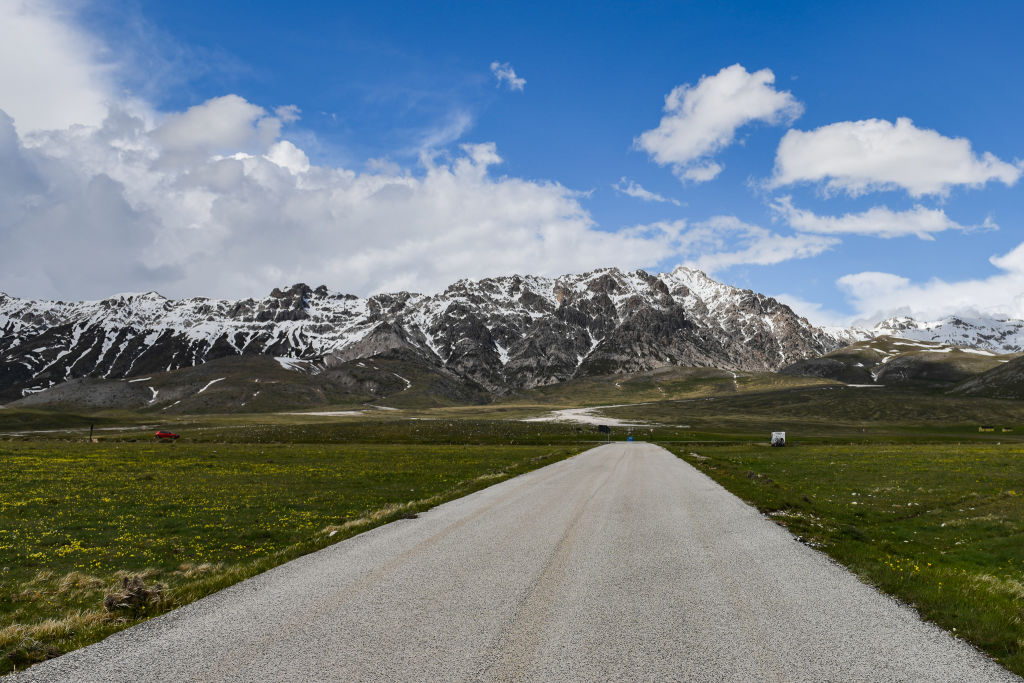
Soudal-QuickStep's close-up
With banks of snow above 2,000m and rain and single-digit temperatures forecast for Friday afternoon, the weather will add considerably to the difficulty of the finale.
"I'm more afraid of the weather than the climbs, to be honest," said Haig, who was a key part of Yates' GreenEdge guard five years ago.
"If it keeps raining like this and we're climbing to 2,000m, it's going to get pretty cold up there. There's not actually a lot of super hard climbing, that's more early on in the stage. I think it's exactly the same as in 2018, and I expect Ineos to show their strength again here."
Ineos directeur sportif Matteo Tosatto was understandably coy about his precise plans for the haul to the Gran Sasso d'Italia, but control has been a byword for the team to this point, and it would be a surprise if they didn't look to replicate their show of force from Lago Laceno, a display that left Haig in no doubt about their depth. "By far the strongest team," he said. "By far."
"The climbs in the finale are long but not very steep," Tosatto told Cyclingnews on Thursday. "Perhaps there's some team that will look to create a bit of casino from a long way out. I don't think it's a very hard stage, but it's a stage where the team will be very important."
Some GC contenders will set out relatively certain of their support. Geraint Thomas and Tao Geoghegan can expect robust cover from their Ineos guard, Primož Roglič should be able to rely on Jumbo-Visma teammate Sepp Kuss, and UAE Team Emirates will look to the duo of Jõao Almeida and Jay Vine.
The day's key question, however, is whether Soudal-QuickStep will be able to stay by Evenepoel's side for longer than they did at Lago Laceno on Tuesday. "We already knew we're maybe not as strong as some others in the mountains, but tomorrow is a good test," Mattia Cattaneo told BiciPro on Thursday. "I'm confident, to be honest, because we're a good group."
Enrico Gasparotto's main concern on Friday will be for the fitness of Aleksandr Vlasov, a faller in Salerno, but he reckoned Soudal-QuickStep would deliver a more assured display at Gran Sasso d'Italia, not least because the DSM team of maglia rosa Andreas Leknessund offers a most useful ally of circumstance in the opening part of the stage.
"The situation for QuickStep is perfect because DSM have the jersey," Gasparotto said. "The chaos of stage 4 came about because there was nobody around to give QuickStep a hand, and it ended up being everybody against everybody – or at least everybody against QuickStep. Now it's different because DSM will look to defend the jersey and do the work early on.
"I think QuickStep were initially trying to defend the jersey on Tuesday, but when they saw how much their guys were having to work, they decided to let it go. And when it comes to trying to win the Giro, I think they did the right thing there. And in the end, they found the best maglia rosa possible for them."
In Naples on Thursday evening, Leknessund was cautiously optimistic about his prospects of defending his 28-second lead over Evenepoel at Gran Sasso d'Italia.
"It's going to be hard, but I believe it's possible to keep it to the time trial," the Norwegian said, though he must know much depends on how the GC men – and, above all, Evenepoel himself – approach those steep final 4km.
"I don't expect big surprises," Tosatto said. "But we might understand some more about people's condition – not just Remco, but all the other GC riders too."
When the Giro last came this way at a similar point in 2018, a slow-burning day ignited on the upper slopes, with Simon Yates jumping clear to claim the first of three stage wins in the maglia rosa, while Chris Froome's concession of more than a minute suggested his path to overall victory was rapidly narrowing.
Two weeks later, of course, everything we thought we had learned at Gran Sasso d'Italia revealed itself to be false. At this early juncture, staying in the game is nine-tenths of the law.

Barry Ryan was Head of Features at Cyclingnews. He has covered professional cycling since 2010, reporting from the Tour de France, Giro d’Italia and events from Argentina to Japan. His writing has appeared in The Independent, Procycling and Cycling Plus. He is the author of The Ascent: Sean Kelly, Stephen Roche and the Rise of Irish Cycling’s Golden Generation, published by Gill Books.
Latest on Cyclingnews
-
'A team that bought in and believed' - Tyler Williams wins Valley of the Sun Stage Race for L39ION of LA while Virginia's Blue Ridge TWENTY28 wins women's three stages and GC
Marjorie Rinaldo earns the overall for pro women as VBR's Continental squad extends win streak to five years at Arizona race -
Fresh starts and home favourites: Five riders to watch at the 2026 Volta ao Algarve
We run the rule over the GC favourites at this week's five-day stage race -
'There's a lot of emotion in my head' – Jan Christen apologises for causing crash that put Maxim Van Gils out of action
Swiss rider disqualified for Clásica Jaén move which left Belgian with a fractured pelvis -
Wind tunnel tested: How does the new Cannondale SuperSix Evo compare to its superbike rivals... and the old one?
Some deeper tubing, lighter weight, wider clearances, and refined geometry aim to make the SuperSix an even more rounded race bike, but is it faster in the tunnel?
